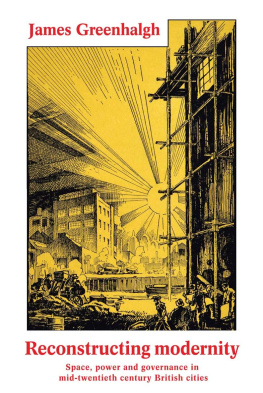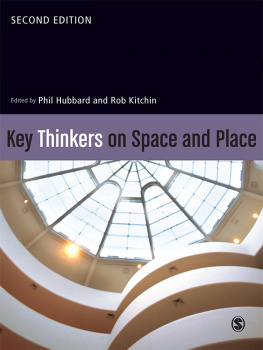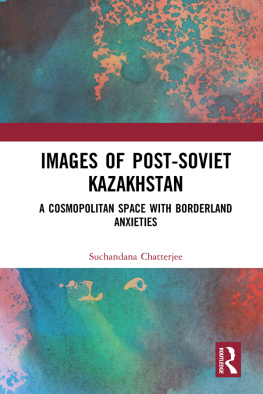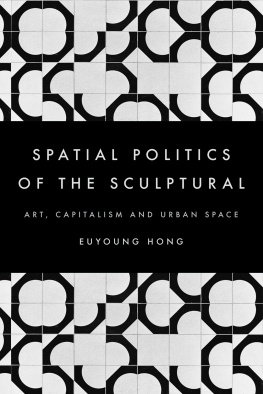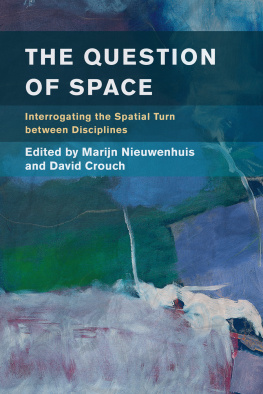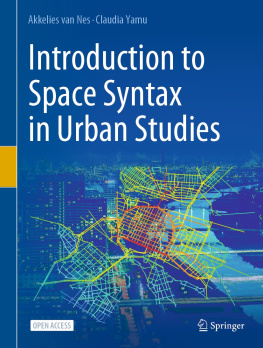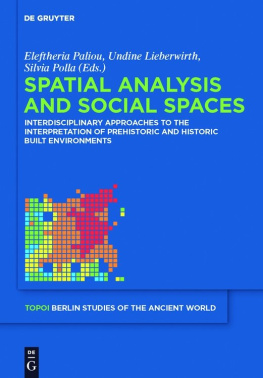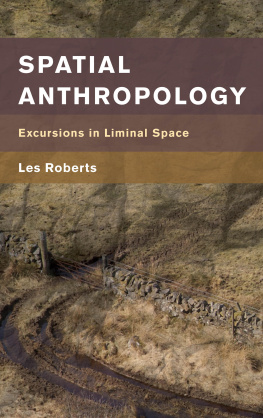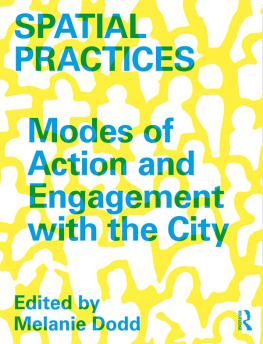City of the Future
Integration and Conflict Studies
Published in Association with the Max Planck Institute for Social Anthropology, Halle/Saale
Series Editor: Gnther Schlee, Director of the Department of Integration and Conflict at the Max Planck Institute for Social Anthropology
Editorial Board: Brian Donahoe (Max Planck Institute for Social Anthropology), John Eidson (Max Planck Institute for Social Anthropology), Peter Finke (University of Zurich), Joachim Grlich (Max Planck Institute for Social Anthropology), Jacqueline Knrr (Max Planck Institute for Social Anthropology), Bettina Mann (Max Planck Institute for Social Anthropology), Stephen Reyna (Max Planck Institute for Social Anthropology)
Assisted by: Cornelia Schnepel and Viktoria Zeng (Max Planck Institute for Social Anthropology)
The objective of the Max Planck Institute for Social Anthropology is to advance anthropological fieldwork and enhance theory building. Integration and conflict, the central themes of this series, are major concerns of the contemporary social sciences and of significant interest to the general public. They have also been among the main research areas of the institute since its foundation. Bringing together international experts, Integration and Conflict Studies includes both monographs and edited volumes, and offers a forum for studies that contribute to a better understanding of processes of identification and inter-group relations.
Volume 1
How Enemies are Made: Towards a Theory of Ethnic
and Religious Conflict
Gnther Schlee
Volume 2
Changing Identifications and Alliances in North-East
Africa
Vol. I: Ethiopia and Kenya
Edited by Gnther Schlee and Elizabeth E.
Watson
Volume 3
Changing Identifications and Alliances in North-East
Africa
Vol. II: Sudan, Uganda, and the Ethiopia-Sudan
Borderlands
Edited by Gnther Schlee and Elizabeth E.
Watson
Volume 4
Playing Different Games: The Paradox of Anywaa and
Nuer Identification Strategies in the Gambella Region,
Ethiopia
Dereje Feyissa
Volume 5
Who Owns the Stock? Collective and Multiple Property
Rights in Animals
Edited by Anatoly M. Khazanov and Gnther
Schlee
Volume 6
Irish/ness Is All Around Us: Language Revivalism
and the Culture of Ethnic Identity in Northern
Ireland
Olaf Zenker
Volume 7
Variations on Uzbek Identity: Strategic Choices,
Cognitive Schemas and Political Constraints in
Identification Processes
Peter Finke
Volume 8
Domesticating Youth: Youth Bulges and their Socio
Political Implications in Tajikistan
Sophie Roche
Volume 9
Creole Identity in Postcolonial Indonesia
Jacqueline Knrr
Volume 10
Friendship, Descent and Alliance in Africa:
Anthropological Perspectives
Edited by Martine Guichard, Tilo Grtz, and
Youssouf Diallo
Volume 11
Masks and Staffs: Identity Politics in the Cameroon
Grassfields
Michaela Pelican
Volume 12
The Upper Guinea Coast in Global Perspective
Edited by Jacqueline Knrr and Christoph Kohl
Volume 13
Staying at Home: Identities, Memories and Social
Networks of Kazakhstani Germans
Rita Sanders
Volume 14
City of the Future: Built Space, Modernity and Urban
Change in Astana
Mateusz Laszczkowski
City of the Future
Built Space, Modernity and Urban Change in Astana
Mateusz Laszczkowski
Published by
Berghahn Books
www.berghahnbooks.com
2016 Mateusz Laszczkowski
All rights reserved. Except for the quotation of short passages for the purposes of criticism and review, no part of this book may be reproduced in any form or by any means, electronic or mechanical, including photocopying, recording, or any information storage and retrieval system now known or to be invented, without written permission of the publisher.
Library of Congress Cataloging-in-Publication Data
Names: Laszczkowski, Mateusz, author.
Title: City of the future: built space, modernity and urban change in Astana / Mateusz Laszczkowski.
Description: New York: Berghahn Books, [2016]. | Series: Integration and conflict studies ; v. 14 | Includes bibliographical references and index.
Identifiers: LCCN 2016024955 | ISBN 9781785332562 (hardback: alk. paper) | ISBN 9781785332579 (ebook)
Subjects: LCSH: Astana (Kazakhstan)Social conditions. | Urban renewalKazakhstanAstana. | Group IdentityKazakhstanAstana. | Sociology, UrbanKazakhstanAstana.
Classification: LCC HN670.23.A95 L33 2016 | DDC 307.3/416095845dc23
LC record available at https://lccn.loc.gov/2016024955
British Library Cataloguing in Publication Data
A catalogue record for this book is available from the British Library
ISBN 978-1-78533-256-2 (hardback)
ISBN 978-1-78533-257-9 (ebook)
For Ania, with love
Maps, Figures and Tables
Maps
Figures
Tables
Acknowledgements
This book is based on my doctoral dissertation, the fruit of a fellowship at the Max Planck Institute for Social Anthropology in Halle. The research was made possible by SocAnth Marie Curie Early Stage Training network MEST-CT-2005-020702.
Many people have contributed to my research and the completion of this manuscript. First and foremost, I am indebted to my doctoral supervisors, Gnther Schlee, Svetlana Jacquesson and Catherine Alexander, for their advice and often challenging commentary. Throughout the several years I spent working on this project, their help has been absolutely invaluable. I am grateful to the Max Planck Institute for Social Anthropology for providing me with an institutional home, and to Michael Stewart for creating and coordinating the Marie Curie SocAnth programme, which provided essential financial support.
My debt is equally great to the many people in Kazakhstan whose openness, hospitality, willingness to share knowledge as much as uncertainty, and friendship, made my fieldwork possible; in the pages that follow, many of them appear under pseudonyms. I wish particularly to thank Mira and her parents, Margarita and her mother, Chernii, Kirill and Giselle, Bella and Sputnik, Bakytgul and Aleksandra Stepanovna and her family, but also others who are not mentioned directly in the text. A separate place must be reserved for my local research assistant, who appears in one episode below as Tasha. Moreover, I am thankful to local scholars who provided me with support in getting established in the field and carrying out my research: first of all, Kulshat Medeuova, as well as Zhanar Jampeissova and Aigul Zabirova. I thank Pawe Jessa and Barbara Kaczmarczyk, who were consuls at the Polish embassy in Astana at the time of my fieldwork and offered me far more support than their official duties required.
Many colleagues my peers as well as senior scholars provided stimulating commentary on various parts of the manuscript, at different stages of its preparation. Often, beyond strictly intellectual exchange, their company simply made my life much more enjoyable during the years spent working on this project. I wish to thank Sally Cummings, John Eidson, Joachim Grlich, Joachim Otto Habeck, Bettina Mann, Stephen Reyna and Lale Yalin-Heckmann, as well as Aida Alymbaeva, Ogato Ambaye, Echi Gabbert, Aksana Ismailbekova, Mariya Ivancheva, Patrice Ladwig, Azim Malikov, Maria Nakhshina, Zhanara Nauruzbayeva, Mihai Popa, Rita Sanders, Phillip Schrder, Hans Steinmller, Oliver Tappe, Andr Thiemann, Tommaso Trevisani, Roberta Zavoretti and the participants of the research colloquia at the Max Planck Institute. Felix Girke, Judith Beyer and Madeleine Reeves deserve special credit for sharing their thoughts on numerous occasions, covering a broad range of topics of mutual interest, and helping me develop my ideas about a great many things, also beyond the scope of this book. They became dear friends and I feel I have learned a lot from them. Natalie Koch, author of excellent articles on Astana, offered extensive, incisive and very helpful comments on earlier versions of this manuscript. I wish to thank her for that, and also to extend my gratitude to my other fellow Astanologists: Alima Bissenova and Adrien Fauve, for continuously rediscovering and sharing the interest for what may sometimes seem not exactly the most fascinating field-site on Earth Astana, that dusty, noisy city with its landscapes of concrete and its climate that had once made the region a fitting site for the Gulag. In the pages that follow, I hope to have conveyed some of what we all found so captivating about the place.


